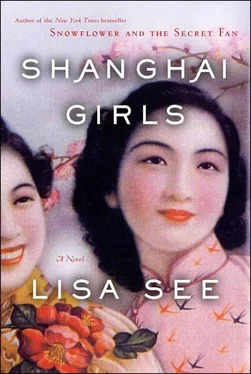Perhaps realizing she’s stealing Joy from me, my sister gives me Vern. “He’ll be with you all the time,” she says, “to make sure nothing bad happens. He can take care of simple things, like getting you tea. And if there’s an emergency-and there won’t be-he can come and get one of us.”
Anyone would think May’s offer would please Sam, but he doesn’t like the idea one bit. Is Sam jealous? How can he be? Vern is a grown man, but as we spend our days together, he seems to shrink while my belly grows. Still, Sam won’t let Vern sit next to me at dinner or any other meal. As a family we accept this, because Sam is going to be a father.
We spend a lot of time talking about names. This isn’t like when May and I named Joy. Father Louie will have the honor and duty of naming his grandson, but that doesn’t mean everyone doesn’t have an opinion or try to sway him.
“You should name the baby Gary for Gary Cooper,” my sister says.
“I like my name. Vernon.”
We smile and say that’s a nice idea, but no one wants to name a baby after a person so defective that if he’d been born in China he would have been left outside to die.
“I like Kit for Kit Carson or Annie for Annie Oakley.” This of course comes from my cowgirl daughter.
“Let’s name him after one of the ships that brought the Chinese to California -Roosevelt, Coolidge, Lincoln, or Hoover,” Sam says.
Joy giggles. “Oh, Dad, those are presidents, not boats!”
Joy often makes fun of her father for his poor understanding of English and American ways. At the very least, this should hurt his feelings. At the most, he should punish her for being unfilial. But he’s so happy about his coming son that he pays no attention to his daughter’s tart tongue. I tell myself I have to stop this trait in our girl. Otherwise she’ll end up like May and me when we were young: rude to our parents and flagrantly disobedient.
Some of our neighbors also give suggestions: One named a son after the doctor who delivered the baby. Another named a daughter after a nurse who’d been particularly kind. The names of midwives, teachers, and missionaries fill cribs throughout Chinatown. I remember how Miss Gordon saved Joy’s life, so I suggest the name Gordon. Gordon Louie sounds like a smart, successful, non-Chinese man.
When my fifth month comes, Uncle Charley announces that he’s returning to his home village as a Gold Mountain man, saying, “The war’s over and the Japanese are gone from China. I’ve saved enough and I can live well there.” We host a banquet, we shake his hand, and we drive him to the port. It seems that for every wife who arrives in Chinatown, another man goes home. Those who’ve always seen themselves as sojourners are now finding their happy endings. But not once does Father Louie, who always said he wanted to return to Wah Hong Village, bring up the idea of closing the Golden enterprises and taking us back to China. Why would he retire to his home village when at last he’s going to get his grandson, who will be an American citizen by birth, venerate his grandfather when he goes to the afterworld, and learn to hit baseballs, play the violin, and become a doctor?
At the beginning of my sixth month, I receive a piece of mail with stamps from China. I eagerly rip open the envelope and find a letter from Betsy. I can’t believe she’s alive. She survived her time in the Japanese camp by the Lunghua Pagoda, but her husband didn’t. “My parents want me to join them in Washington to regain my health,” she writes, “but I was born in Shanghai. It’s my home. How can I leave it? Don’t I owe it to the city of my birth to help with the rebuilding efforts? I’ve been working with orphans…”
Her letter reminds me that there’s one person I would like to hear from or about. Even after all these years, Z.G. still comes into my mind. I put a hand on my belly-which protrudes like a steamed bun-feel the baby move inside me, and visit my artist and Shanghai in my mind. I’m not lovesick or homesick. I’m just pregnant and sentimental, because my past is simply that-past. My home is here with this family I’ve built from the scraps of tragedy. My hospital bag is packed and sitting by the door to our room. In my purse I carry fifty dollars in an envelope to pay for the delivery. Once the baby’s born, he’ll come home to a place where everyone loves him.
SO OFTEN WE’RE told that women’s stories are unimportant. After all, what does it matter what happens in the main room, in the kitchen, or in the bedroom? Who cares about the relationships between mother, daughter, and sister? A baby’s illness, the sorrows and pains of childbirth, keeping the family together during war, poverty, or even in the best of days are considered small and insignificant compared with the stories of men, who fight against nature to grow their crops, who wage battles to secure their homelands, who struggle to look inward in search of the perfect man. We’re told that men are strong and brave, but I think women know how to endure, accept defeat, and bear physical and mental agony much better than men. The men in my life-my father, Z.G., my husband, my father-in-law, my brother-in-law, and my son-faced, to one degree or another, those great male battles, but their hearts-so fragile-wilted, buckled, crippled, corrupted, broke, or shattered when confronted with the losses women face every day. As men, they have to put a brave face on tragedy and obstacles, but they are as easily bruised as flower petals.
If we hear that women’s stories are insignificant, then we’re also told that good things always come in pairs and bad things happen in threes. If two airplanes crash, we wait for a third to fall from the sky. If a motion-picture star dies, we know that another two will succumb. If we stub a toe and lose our car keys, we know that another bad thing must happen to complete the cycle. All we can hope is that it will be a bent fender, a leaky roof, or a lost job rather than a death, a divorce, or a new war.
The Louie family’s tragedies arrive in a long and devastating cascade like a waterfall, like a dam burst open, like a tidal wave that breaks, destroys, and then pulls the evidence back to sea. Our men try to act strong, but it is May, Yen-yen, Joy, and I who must steady them and help them bear their pain, anguish, and shame.
IT’S THE BEGINNING of summer 1949, and the June gloom is worse than usual, especially at night. Damp fog creeps in from the ocean and hangs over the city like a soggy blanket. The doctor tells me that the pains will start any day now, but maybe the weather has lulled my baby into inactivity or maybe he doesn’t want to come into a world so gray and cold when he is surrounded by warmth where he is. I don’t worry. I stay at home and wait.
Tonight Vern and Joy keep me company. Vern hasn’t been feeling well lately, so he’s asleep in his room. Joy has just one more week of fifth grade. From where I sit at the dining table, I can see her curled up on the couch and frowning. She doesn’t like practicing her times tables or seeing how fast she can complete the pages of long division her teacher has given her to increase her speed and accuracy.
I look back down at the newspaper. Today I’ve returned to it again and again, believing and then refusing to believe what I’ve read. Civil war is tearing apart my home country. Mao Tse-tung’s Red Army has been pushing across China as steadily and as relentless as the Japanese once did. In April, his troops seized control of Nanking. In May, he grabbed Shanghai. I remember the revolutionaries from the cafés I used to frequent with Z.G. and Betsy. I remember how Betsy used to get more riled up than they did, but for them to take over the country? Sam and I have talked a lot about this. His family were peasants. They had nothing. If they had lived, they would have had everything to gain from a Communist system, but I came from the bu-er-ch’iao-ya- bourgeois class. If my parents were still alive, they’d be suffering. Here, in Los Angeles, no one knows what will happen, but we hide our worries behind forced smiles, no-meaning words, and a constant false face presented to Occidentals, who are far more terrified of the Communists than we are.
Читать дальше












